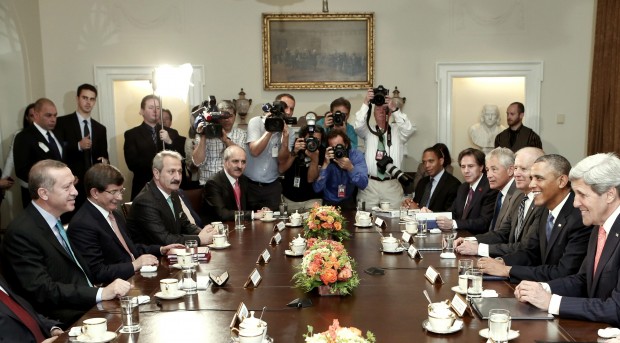
US President Barack Obama (2nd R) meets Turkey’s Prime Minister Recep Tayyip Erdogan (L) as they sit with their delegations in the Cabinet Room of the White House in Washington May 16, 2013. (REUTERS/Kevin Lamarque)
While the visit was also promoted as an attempt to boost economic ties and persuade Washington to sign a free trade agreement with Ankara, the issue of Syria has taken on added importance following the car bombs that struck the Turkish town Reyhanli on the Syrian border last weekend, killing over 50 people.
Analysts say Erdoğan is likely to press Obama to take a more active role in ending the conflict in Syria.
Fadi Hakura, an associate fellow at the London-based foreign affairs think-tank Chatham House specializing in Turkish affairs told Asharq Al-Awsat that Erdoğan is most likely to press Obama to “try to implement a no-fly zone over Syria, to provide lethal assistance, by which I mean weapons, to the Syrian opposition, and generally to take a more active role.”
He added that Erdoğan was coming under increasing pressure over his stance on Syria.
“He calculated that [Bashar] Al-Assad would be deposed in a short time, but what he did what he did not foresee was the resilience and durability of Assad, and that has put a lot of pressure on the prime minister.”
Speaking on condition of anonymity, official Turkish sources told Asharq Al-Awsat earlier this week that Ankara will do “all it can” to support the American government should it decided to intervene by establishing of a safe zone or a no-fly zone. A source said: “There is a lot we are capable of doing. We are ready.”
Other sources said that Turkey will propose plans for securing weapons and training the Free Syrian Army as well as establishing safe passageways and no-fly zones at a meeting at the Pentagon with the US Secretary of Defense and senior US military commanders. Sources claimed: “These plans will be examined thoroughly in the Department of Defense and will be put into action once a political decision is made.”
However, experts cautioned that Erdoğan’s requests for greater US involvement were likely to fall on deaf ears, given Obama’s reluctance to intervene in Syria directly and Erdoğan’s limited influence over the American president.
Hakura said that Obama was likely to be “sympathetic” to Erdoğan’s appeals, but was not likely to change his mind.
“Obama has been very reticent towards Syria . . . Turkey does not have that much leverage to put pressure on Obama,” he added.
Meanwhile, in Turkey, President Abdullah Gül criticized the international community earlier today for its failure to do more to help Turkey accommodate refugees fleeing Syria, saying that its efforts had been dominated by “rhetoric.”
Turkey is currently home to approximately 400,000 Syrians.
On a visit to the town of Reyhanli, Gül said: “The international community’s contribution to Turkey’s financial aid to these people who are in a difficult situation is only symbolic,” according to the Reuters news agency.
